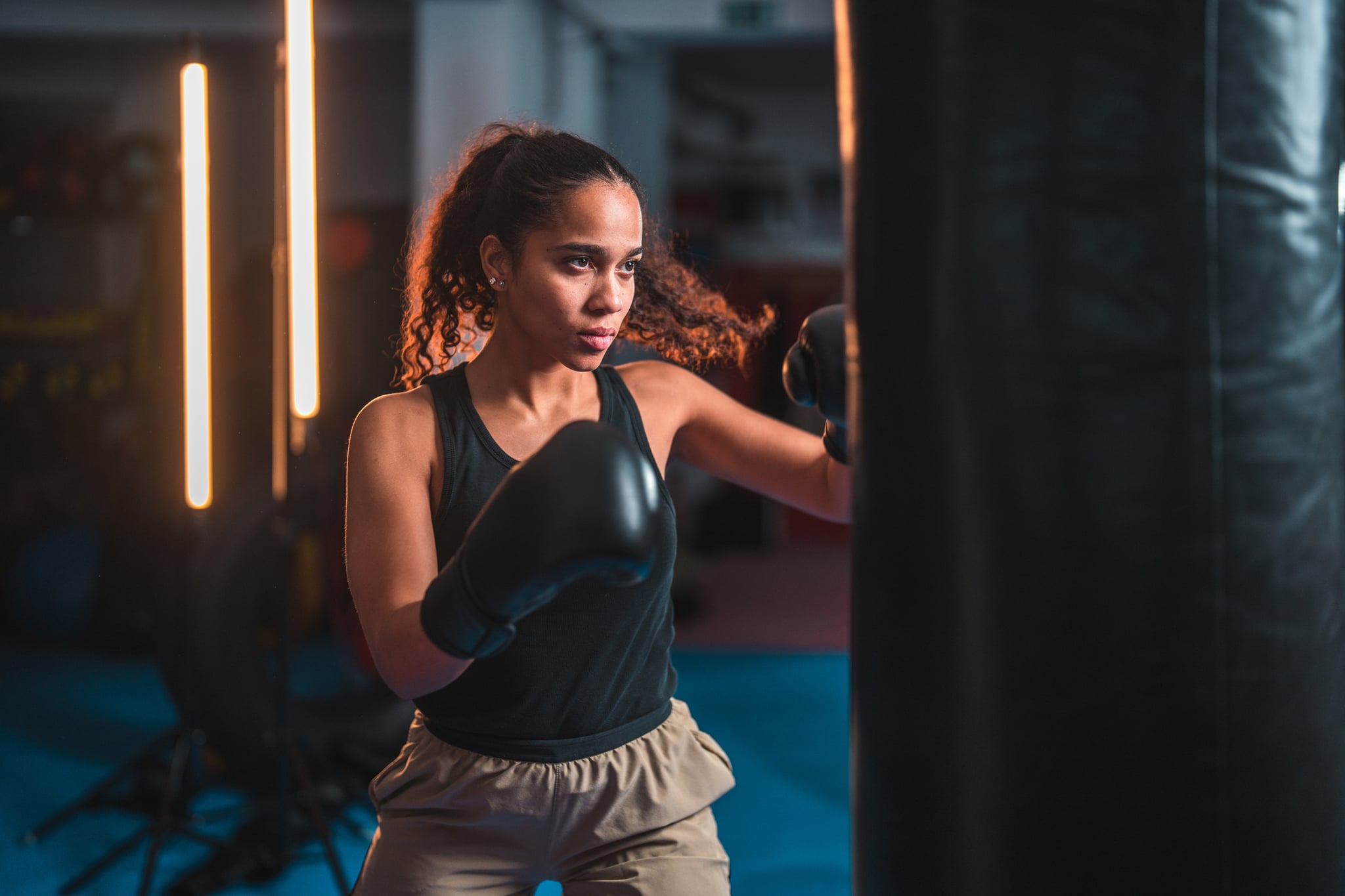Get ready to get in fighting shape: knockout workouts are all the rage right now. The knuckle therapy you can get from a boxing– or martial-arts–inspired workout offers both physical and mental health benefits — and, clearly, plenty of us are here for it.
Pinterest data shows that among the app’s 482 million users, searches for mixed martial arts (MMA) training are up by 200 percent in 2023 compared to 2022, while those for karate kumite — aka training against an opponent — are up by 190 percent, shadow boxing workouts are up by 60 percent, and jiu-jitsu by 30 percent. (The phrase “kick boxing aesthetic” is also up 265 percent, because Pinterest.) Meanwhile, #boxing is highlighted as a trending sport on TikTok with 143.1 billion views.
Fitness studios are feeling the effects and stepping up to meet the demand. Rumble founder Noah Neiman tells POPSUGAR that the boxing-based group fitness gym just hit an all-time record high for revenue in November. Responding to client interest, in spring 2023, Equinox rolled out a new class called Knockout, designed by former WWE Diva Erika Hammond. And Crunch is launching three new combat-sport–based workouts in January 2024: one focused on fighting-inspired agility and footwork, one that mixes shadowboxing and kettlebells, and another featuring MMA-style drills.
Of course, this isn’t the first time gym-goers have thrown their hats in the ring. Remember Billy Blanks and the cult-like following his Tae Bo classes had in the 1990s? Well, just like baggy jeans and bucket hats, this fad is back. It seems that many of those who first took up kickboxing in the ’90s and early 2000s have returned for a second round: Wendy Cope, an ACE-certified group fitness instructor and the Southeast regional group fitness manager for Crunch, says that while she sees growing interest across the board, women in their 30s to 50s in particular seem to be drawn to these classes. “They like the intensity, but it’s really fun,” she says.
Why Fighting Is Trending
How come there’s so much interest in throwing our fists around these days? “It taps into our oldest instincts: fight or flight,” Neiman says. “There’s this primordial attraction to it that we don’t get to express in civilized society that much. Our ancestors needed to hone these skills to literally survive.”
“It’s a way to emotionally regulate, because if you can really ground and pound on a bag . . . you can get that energy out.”
Coming out of COVID, Cope points out that lots of us “have some unresolved issues,” which these workouts can be an outlet for. “It’s a way to emotionally regulate, because if you can really ground and pound on a bag — and you don’t have to be angry at a person, it could be frustration over a situation — you can get that energy out,” she says.
Also thanks to COVID, the buzzword in the fitness industry theses days is “experience.” And wrestling a stranger to the ground in a jiu-jitsu class feels like a far more memorable — and fun — experience than just lifting dumbbells up and down again in your living room.
What’s more, Neiman points out that influencer exhibition matches, particularly among YouTubers and podcasters, have been on the rise ever since Kim Kardashian stepped into the ring to spar in 2009. This June, Elon Musk of X (formerly Twitter) challenged Meta’s Mark Zuckerberg to a cage match; the pair even went so far as to contact the Ultimate Fighting Championship about it. They ultimately backed down, but not before getting millions of people talking about which of these tech titans might win.
The Health Benefits of Brawling
Another reason gym-goers are taking up combat sports is because they make for an, ahem, killer workout. “There’s a reason they say you want to be a ‘lean, mean fighting machine,'” Neiman says. Most of today’s fighting-based fitness classes include a mix of cardio conditioning and strength training, and many also incorporate mobility training to open up your range of motion. Put together, this makes for a uniquely well-rounded training regimen.
The full-body movements required for fighting strengthen you from head to toe, including some muscle groups that often get overlooked, like the back. At the same time, performing footwork in multiple planes of motion builds your agility, and when combined with upper-body punching or grappling, it also challenges your balance — one 2021 study found that boxing therapy helped to decrease falls in Parkinson’s patients by a whopping 87 percent. Your brain health also benefits, due to the cognitive challenge of learning and remembering combinations.
“A lot of times, our bodies don’t know that they’re tense until we tense them up even more and then relax.”
Releasing pent-up stress by punching and kicking clearly has mental health benefits, too. One 2020 study found that martial arts training can reduce negative mental health symptoms, decrease aggression, and improve overall well-being. “A lot of times, our bodies don’t know that they’re tense until we tense them up even more and then relax,” Cope says. Also a yoga instructor, Cope says she finds the combinations done in boxing-inspired workouts “kind of become a moving meditation. . . . You don’t have time to have that mental chatter.”
One factor that shouldn’t be underestimated is just how empowering it can be to learn to fight, Neiman adds. Whether you actually have to physically defend yourself in real life or not, knowing that you could can build serious confidence. And there’s no better sparring partner than that.
Image Source: Getty / AzmanL
